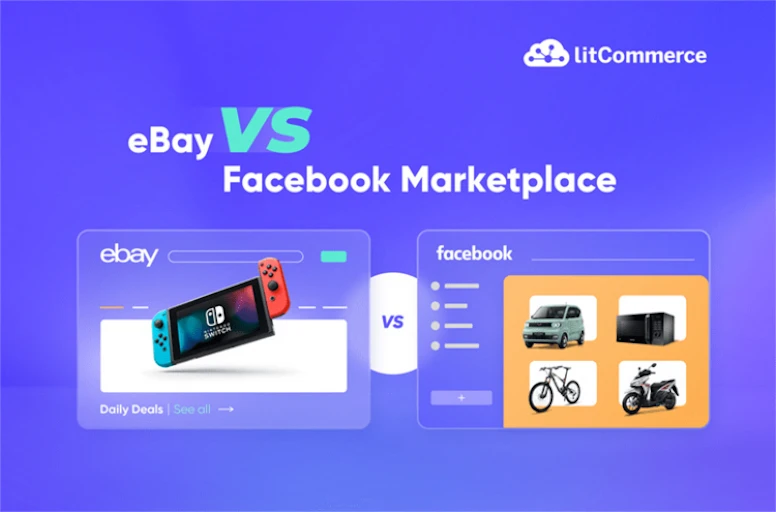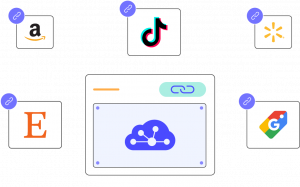For those who fancy making extra money online, you probably have heard of eBay vs Facebook Marketplace. The former has been around for decades, while the latter only rise to be one of the top marketplaces in recent years.
Even though both offer extensive opportunities to list products and find customers, you may want to consider if eBay or Facebook Marketplace would better suit your business. Speaking of an in-depth eBay vs Facebook Marketplace comparison, there are 6 factors you need to consider, including:
For now, LitCommerce will be your guiding star and help decide whether selling on Facebook Marketplace or eBay makes your best channel. Let’s kick it!
Sell on eBay and Facebook Marketplace At Once!
Which would make your best sales channel? eBay or Facebook Marketplace? Why not both? By using LitCommerce, you can seamlessly list and sell on both channels. Try it out now!
Learning The Basics: eBay vs Facebook Marketplace
Both eBay and Facebook Marketplace are the best selling platforms in the field. If the idea of starting a business on these two marketplaces gets your attention, you probably want to learn the basics of eBay vs Facebook Marketplace, notably the pros and cons. Here are the details.
Key differences between eBay and Facebook Marketplace:
- eBay offers a broad global reach and various seller tools but includes various selling fees and high competition.
- Facebook Marketplace is better for local sales, with no selling fees and direct communication with buyers, but it lacks seller protection.
- To sum up, Facebook Marketplace is well-suited for side hustles, whereas eBay provides a platform better suited for scaling a professional business.
What is eBay?
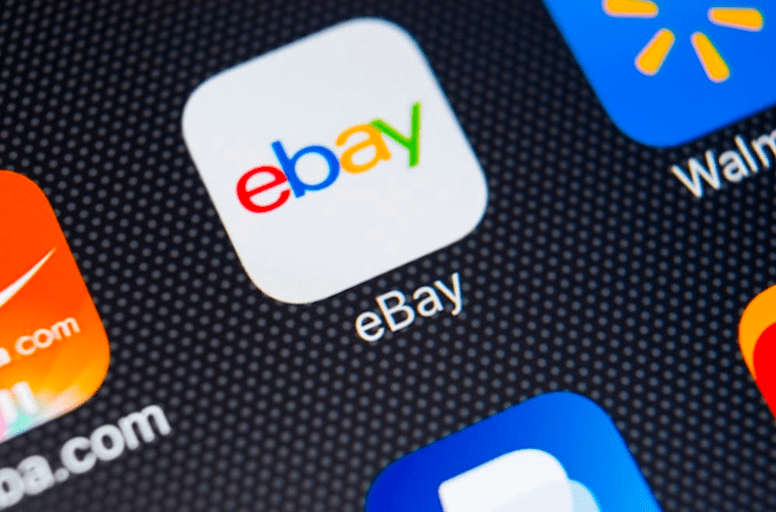
Selling on eBay is intensively competitive yet extremely rewarding. This eCommerce market leader is now connecting 18 million sellers and 133 active buyers with a main focus on its auction platform and shopping website. Since eBay’s 1995 inception, it is well-reputed for its “Buy it Now” shopping services, online classified adverts, and online event ticket trading.
Speaking more of benefits of an eBay store, sellers not only access eBay’s vast audience but also solid protection, an international shipping program, and many more. Without a doubt, this platform definitely creates greater chances for international and domestic sellers to streamline cash online.
Pros of selling on eBay
As mentioned, there are many countless benefits of selling on eBay, namely:
- Access to global buyers;
- Excessive monthly traffic;
- Seller and user protection;
- Diverse product variations;
- Supportive domestic and international shipping;
- High sense of brand-building.
Cons of selling on eBay
However, the channel has some downsides, which might be its disadvantages in the comparison of eBay vs Facebook Marketplace:
- Comparatively high seller fees;
- Inadequate support for sellers;
- Possibly expensive and complicated shipping;
- Rough competition.
What is Facebook Marketplace?

To summarize Facebook Marketplace reviews, it is a feature launched by Meta in 2016 that allows Facebook users to conveniently sell and buy items within their community.
In particular, Facebook Marketplace selling offers a whole-package experience within one application. While selling on Facebook Marketplace, you can take advantage of other integrated features. They surely include using Messenger or Facebook Ads to communicate or make deals and reach out to customers.
However, Facebook Marketplace didn’t stay among the top eBay alternatives for its integrated features. They are Facebook Marketplace’s fast growth rate, affordable seller fees, and chances for SMEs to approach millions of new customers thanks to Meta’s massive audience.
Now, let’s come to a grasp of the pros and cons when you sell on Facebook Marketplace.
Pros of selling on Facebook Marketplace
In the eBay Facebook comparison, what are the pros of selling on Facebook Marketplace? Here are our highlights for this sales channel:
- Affordable seller fees;
- Excessive customer base;
- Convenient integrated communication and ads features;
- Simple listing creation;
- Quick and direct transactions within the local community.
Cons of selling on Facebook Marketplace
Despite the benefits mentioned above, this channel has a few drawbacks. Evidently, you need to consider them before deciding whether eBay vs Facebook Marketplace makes a better choice.
- Encouragement to physical items sales only;
- Common frauds and scamming;
- Limited onsite buyer and seller protection.
eBay vs Facebook Marketplace: Which One Suits You More?
Here we are, landing at the most thrilling part – selling on eBay vs Facebook Marketplace. Evidently, eBay and Facebook Marketplace selling journeys differentiate one another excessively, based on 6 following factors:
- Products
- Segmentation
- Selling fees
- Ease of use
- Selling features
- Applied policies and protection for sellers
Now, let’s keep you waiting no more and dig into the details in our eBay vs Facebook Marketplace comparison!
#1. Products
One of the biggest differences between selling on Facebook Marketplace vs eBay gets down to their products. Regarding products, the two sales channels are not on opposite sides. However, they have highly differentiated product diversity, top-selling categories, and product restrictions.
Here are our detailed explanations on eBay Facebook comparison within the product aspect.

eBay products
Among key points that help the eBay marketplace become a market leader in nowadays eCommerce landscape, eBay’s massive product range is certainly a contributing factor. In fact, you can almost put whatever items for sale on eBay, from new to used, niche to general, and rare products that aren’t available on other channels.
Going into details, eBay is now hosting 12 parent categories, which are:
- eBay motors
- Clothing, shoes, and accessories
- Sporting goods
- Home and garden
- Toys and hobbies
- Business and industrial
- Health and beauty
- Pet supplies
- Baby essentials
- Electronics
- Collectibles and art
- Books, movies, and music
Although the number of parent categories only stops at 12, each of them might have up to hundreds of sub-categories divided into 3 levels with detailed names. As a result, the real category list on eBay can reach thousands. Within these categories, items that sell best on eBay belong to Home, clothing and accessories, eBay motors, electronics, books, music, and collectibles.
More on the product aspect in our eBay vs Facebook Marketplace comparison, eBay has set 69 rules for product prohibition and restrictions. They include policies for adult items, alcohol, animal products, collectibles, motor parts, event tickets, and many more. Detailed consultancy with prohibited and restricted policies is definitely advisable before you sell on eBay.
Facebook Marketplace products
In our comparison of eBay vs Facebook Marketplace, Facebook appears to offer a less diverse product category list despite the number 18. Currently, this sales channel hosts the following 18 categories:
- Vehicles
- Property rentals
- Apparel
- Classifieds
- Electronics
- Entertainment
- Family
- Free stuff
- Garden and outdoor
- Hobbies
- Home goods
- Home improvement supplies
- Musical instruments
- Home sales
- Office supplies
- Pet supplies
- Sporting goods
- Toys and games
From our perspective, Facebook Marketplace hasn’t done its best in naming or dividing all product segments. For instance, the Family and Classified categories might appear confusing at first for both sellers and buyers. If raising the comparison of eBay vs Facebook Marketplace at this point, eBay seems to have a competitive advantage.
Moving on with our analysis of products, apparel, electronics, home goods, garden and outdoor, sporting goods, instruments, toys, and games belong to the best selling items on Facebook Marketplace. Also, it is worth noting that you can sell used items on Facebook Marketplace, but you must submit an exact product condition description (New – Like New – Used but Good – Used but Fair – Refurbished).
That’s what you need to acknowledge of products to sell and resell on Facebook. Now, for Facebook-banned items, this marketplace is now applying 26 rules for prohibited product content and 3 rules on product restrictions, including:
Prohibited items or services for Facebook sales listings
- Products that violate Community standards
- Adult products
- Alcohol
- Body parts and fluids
- Digital media and electronic devices (Devices that encourage unauthorized streaming or interfere with other devices’ functionality)
- Products showing discrimination in any kind
And 20 more written in Meta’s Commerce Policies.
Restricted items or services for Facebook sales listings
- Events or admission tickets
- Gift cards and vouchers
- Pet adoption matching services
Verdict: Comparing eBay vs Facebook Marketplace on products, eBay might be 1 point ahead for their excessive product diversity and clear category division. However, eBay also set more regulations on prohibited and restricted products than Facebook Marketplace.
#2. Segmentation
In the previous section of our eBay vs Facebook Marketplace topic, we answered the question “What to sell on eBay or Facebook Marketplace?”. For this part, let’s take a glance at who you will sell to on eBay and Facebook.

eBay segmentation
In general, eBay is a male-dominated marketplace with 68.3% of its total visitors. This status hasn’t changed since 2018. Yet, male buyers are coming to eBay more, and the ratio has increased from 57% to almost 70% of the total audience.
Probably what changed the most about eBay’s segmentation is age ranges. Back in 2018, the largest buyer group belongs to the range from 35 to 49 years old. However, in 2023, there has been a shift when the group of 25 to 34 years old is taking the lead (25.81%), followed by the 35 to 44 years old (18.96%) and another of 18 to 24 years old (18.91%). Many also predict that we may witness another shift in eBay buyers’ age ranges in the next few years.
Beyond the collected data of age and gender, eBay’s buyers are described as enthusiastic shoppers, value seekers, and savvy bidders. Explained more, if there is anything that all shoppers on eBay have in common, that would be price consciousness. This is also why pricing competition on eBay always stays fierce.
Facebook Marketplace segmentation
Different marketplaces have very distinguished audiences, and it does not exclude our case of selling on eBay vs Facebook Marketplace. Similar to eBay, Facebook Marketplace is still a male-dominated sales channel with more than 61% of total users being men. Surprisingly, the largest group also belongs to people of 25 to 34 years old.
However, shopping behaviors and buyers’ intentions of Facebook Marketplace vs eBay are completely different. While people tend to look for rare products or the best bargains on eBay, Facebook Marketplace encourages demands in apparel, secondhand luxurious items, and furniture. This means they don’t always look for the cheapest or unique items but more for consumption goods. Pricing consciousness is still the case, but it isn’t the top priority for Facebook shoppers. On this sales channel, customers prefer a quick transaction, and most importantly they can conveniently buy the wanted items within their communities.
Verdict: In terms of eBay vs Facebook Marketplace segmentation, eBay would be perfect if you are targeting customers who focus on pricing and goods uniqueness without rushing. Meanwhile, Facebook Marketplace is ideal for consumption goods that can turn into instant transactions. Therefore, learning how to sell on Facebook Marketplace locally might be suggestible.
#3. Seller fees
As sellers, you should definitely pay attention to how each platform would charge you for listing products to maximize profitability.
The eBay selling fees vs those of Facebook Marketplace mark a massive difference between them. While Facebook Marketplace fees are pretty much affordable, eBay’s complex and rising charges remain as “feeBay”. For now, let’s discuss further details of eBay vs Facebook Marketplace fees.
eBay seller fees
In terms of pricing, eBay seller fees may appear confusing for beginners. The typical selling cost on eBay includes store subscriptions, listing fees, final value fees, and category referral commissions. Here are some more details of eBay seller costs:
eBay's pricing | ||
Subscription | From $7.95 to $349.95/ month | |
Listing fee | $0.35/ listing (after 250 free listings) | |
Final value fee | $0.30/ order | |
Category referral commission | 8 - 15% of total sale price | |
Expensive as the mentioned fees appear, they have yet to include other fees such as eBay shipping fees, advertising, and multiple image usage. Especially, when selling on eBay, you might face additional charges (added to your final value fees) when you fail to meet its minimum performance standards.
In other cases, your final value fee can increase if you conduct transactions outside, which violates eBay’s selling and buying policies. With so many “feeBay” requirements, is it worth selling on eBay anymore?
For us, it is still worth selling on eBay. As you gain more experience on the platform, there are still ways to declutter additional eBay seller fees and maximize your returns.
Sell on eBay, Facebook Marketplace, and More!
Why choose among platforms when you can integrate them and streamline cash from them all at once? Try LitCommerce today and thrive in the eCommerce realm like never before!
Facebook Marketplace fees
In contrast, Facebook Marketplace fees vs eBay are much more affordable. For anyone starting as an individual seller, Facebook Marketplace is almost free of all selling charges.
That said, merchants and registered sellers still need to pay for selling and chargeback fees. The rate for selling fees is fixed at 5% per shipment or a flat fee of $0.40 for products costing lower than $8.00. Here is everything about Facebook Marketplace selling charges:
Facebook Marketplace's pricing | ||
Flat rate selling fees | 5% per shipment or $0.4 for orders under $8 | |
NO subscription, store setup, and insertion fees | ||
Notes: In case buyers want to return and get their money back, Facebook holds the transaction amount, or “chargeback fee”, until the buyer and seller resolve the issues.
Verdict: For eBay vs Facebook Marketplace pricing, Facebook is having an advantage with less complicated layers and offers free options for individuals. This has turned it into a great place for kickstarters with a limited budget. Meanwhile, eBay is better suitable for experienced and ambitious sellers with a larger scale of listings.
#4. Ease of use
User-friendliness is also a factor worth looking at when choosing eBay or Facebook Marketplace for your online business. We evaluate the user-friendliness of one sales channel based on its UX/UI designs, selling methods, and listing process. The final aim of this evaluation is to conclude whether the chosen marketplace is easy to maneuver and easy to sell on or not.
Let’s look at the user-friendliness of eBay vs Facebook Marketplace and see which one is easier to manage and sell on.
eBay ease of use
In the section below, we will walk you through an evaluation of eBay’s ease of selling. Let’s kick it!
#1. eBay UX/ UI interface
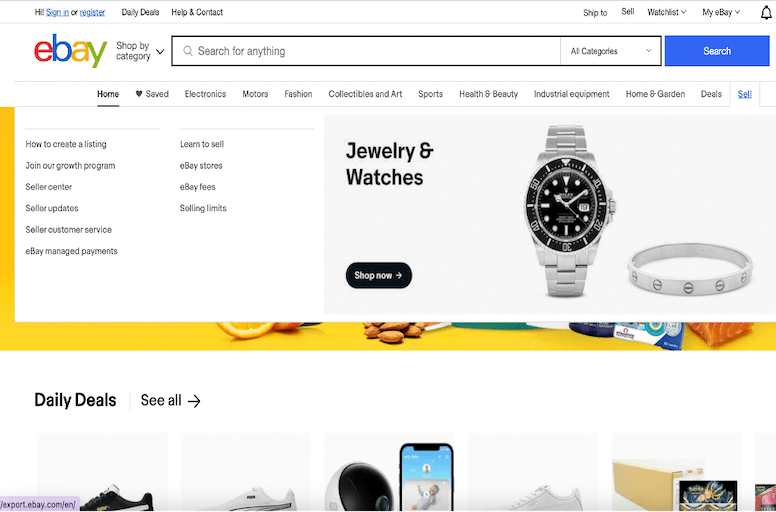
Overall, eBay’s interface is pretty user-friendly for anyone, from newbies to those with experience. Entering eBay, you are likely to see a navigation menu bar right under eBay’s search tool. As you click on Sell, you can then access the listing guide, pricing policies, selling limits, and all resources needed before you go live.
#2. Selling methods
What sets eBay as one of the top-notch alternatives to Facebook Marketplace is probably its flexible selling methods. Notably, selling on eBay is relatively easy, with two selling methods to choose from based on your own business needs.
- Auction-style selling: the selling method that made eBay’s name. To list an item for sale in auction form, set a starting price for a specific waiting duration, then simply sell to the highest bidder at the end of the waiting time. This style works best for unique and collectible items, where the price has no limits.
- Buy it now: eBay also has a traditional selling method with the Buy it Now option. You just need to declare a fixed price and let shoppers decide based on the upfront cost they see.
#3. Listing on eBay
The platform also offers two different ways to list an item. With eBay listing tools, you can simply enter words and categorize them from eBay’s suggestions. Or else, the advanced listing form has more fields to fill in, adding an extra layer of details for your item.
After this, move on with the selling style of your choice and set the price and shipping options to start selling on eBay. And don’t forget that you can list multiple items on eBay following our guide!
Discover how LitCommerce helps you streamline your product listing and management on eBay and Facebook Marketplace. Now, you can benefit from premium features like bulk listing, inventory sync, and automated pricing adjustments across both platforms, while avoiding common issues such as overselling.
Facebook Marketplace ease of use
Next on eBay vs Facebook Marketplace, let’s come to an in-depth review of Facebook selling ease.
#1. Facebook Marketplace’s UX/ UI design
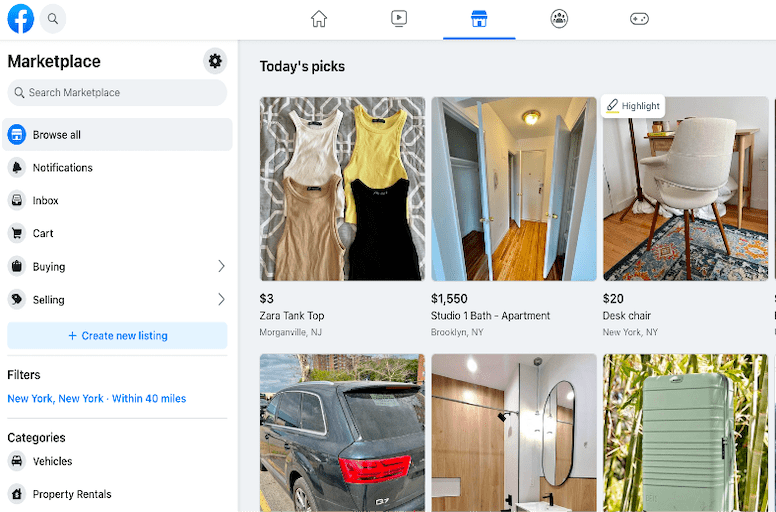
Overall, Facebook Marketplace’s interface is friendly for all sellers whether new or experienced on the platform. In particular, the interface is neatly divided into two main sections.
- The first half on the left is the navigation menu for you to check out Facebook Marketplace’s category list.
- Meanwhile, the other half is for product browsing so that you can see what competitors are selling in the same category as you.
#2. Selling methods on Facebook Marketplace
The selling method is the next aspect in our comparison of eBay vs Facebook Marketplace. While eBay is famous for its Buy It Now and auction selling styles, Facebook becomes favorable for its similar Buy Now and Group Selling.
- Buy Now: You’ll sell and process transactions with your customers as usual.
- Group Selling: You’ll get access to a group, which almost functions as normal ones. Yet, you are allowed to list and sell your items to Facebook users while in such groups.
#3. Listing on Facebook Marketplace
It’s easy to list on Facebook Marketplace thanks to its simple, user-friendly interface. Once you click on the store icon, follow these simple steps:
- Choose a product type you want to list (casual item, vehicle, and property rental or sale)
- Upload a photo.
- Fill in the item title, price, and description.
- Make any adjustments to complete your listings.
You can also add meetup references (public meetup, door pickup, or drop-off) or add a maximum of 20 tags to make the item more searchable. Yet, keep in mind that you can only list a maximum of 150 items per day on Facebook Marketplace.
It’s worth noting that Facebook Shop vs Marketplace are different. Try not to mix up between them, as there are several differences between the way to sell on each platform as well as seller fees.
To sum up, the selling and shopping procedures on Facebook Marketplace are quite straightforward and take barely a minute to maneuver.
Verdict: When it comes to eBay vs Facebook Marketplace ease of navigation, it is pretty much an even. Both platforms have minimal UX/UI designs, flexible selling methods, and simple listing processes that take beginners no time to familiarize themselves.
#5. Selling features
In the comparison of eBay vs Facebook Marketplace, selling features such as order fulfillment, advertising, and customer care also define the core distinction between these two. Pleading our case, Facebook Marketplace is simply a place to list products, while eBay brings about full-fledged eCommerce services.

eBay selling features
In the following analysis of eBay’s selling features, let us be your guiding star and lead you through 3 aspects. They include order fulfillment, shipping, advertising, and brand-building, as well as integration.
#1. eBay order fulfillment & shipping
Evidently, eBay has been offering excellent inventory and order management procedures with extensive networks of warehouses and shipping partners across the globe.
Especially, you can sell to anyone from anywhere in the world with eBay Global Shipping Program. On top of that, shipping with eBay means you can get access to the eBay shipping calculator, eBay shipping labels, eBay label platforms, and eBay return management tools. However, remember that shipping can get complicated in this marketplace, as you must weigh parcels accurately to avoid additional charges.
As a part of completing an order, eBay offers a secure payment process. Specifically, eBay allows transactions through various secured payment methods (such as PayPal, debit or credit card, and cash on delivery). The transaction amount is held by the house and only sent to you until the item is delivered.
#2. eBay advertisement and branding
Is eBay better than Facebook Marketplace in terms of advertising options to boost your chance of selling? Considering this matter, eBay has a strong ability to build a brand and integrate marketing tools into selling.
Because of the enormous number of similar listings on the marketplace, the competition is fierce on eBay. It offers a chance to boost sales by pushing promoted listings at the top of the search result, which will be labeled as sponsored.
In fact, eBay has more than just advertisements but rather extensive marketing options to boost your business. Every eBay shop has a home page where you can opt for a shop template design or make use of various integrations to define your brand identity and impress buyers. Adding to that, you can adopt useful eBay SEO tips to optimize your listings.
#3. eBay integration diversity
As an old hand in eCommerce, eBay has up to 278 different integrations to level up your business. The most popular integrations on eBay are multichannel selling, shipping, order fulfillment and streamlining, warehouse and inventory management, payment processing, and many more.
Speaking of which, LitCommerce also provides some of the most popular eBay integrations for multichannel selling, namely Shopify, WooCommerce, BigCommerce, Wix, and Squarespace.
Facebook Marketplace selling features
Moving on with our eBay vs Facebook Marketplace topic, let’s now learn the selling features of Facebook Marketplace and get you through the pain of deciding which channel to sell on.
#1. Facebook order fulfillment & shipping
Handling orders on eBay vs Facebook Marketplace are two completely different procedures. Meanwhile, eBay offers a variety of managing, shipping, and payment options, Facebook is quite a do-it-yourself experience.
Essentially, Facebook Marketplace is designed with a focus on product listing rather than eCommerce. It does not support transactions, and dropshipping options are only available in the U.S. In exchange, Facebook Marketplace is ideal if you need money straight away and get items quickly purchased within the local community.
#2. Facebook advertisement and branding
Facebook Marketplace advertisement can reach up to 562 million people in its best scenario as Facebook is constantly enhancing its ads platform to fit a larger variety of prospective buyers. That’s surely some impressive figures for Facebook Marketplace traffic to your products. However, Marketplace offers no branding options and does not store buyer information, which limits marketing efforts.
More about Facebook ads, the marketplace claims that you can spend from $5 to $50,000, depending on your targets. Choosing certain groups who approach your ads and setting a schedule is available.
#3. Facebook Marketplace integration diversity
Facebook Marketplace allows you to communicate, deal and make transactions just in one application within just one Facebook account. Particularly, integration with Messenger will expose you to lots of questions and enable easy, direct communication and dealing with customers.
Currently, Facebook focuses on API integration for Meta developers. According to Meta’s documents, such API integration refers to Commerce integration, partner ads, and app setup. Besides, to connect Facebook with other selling sites as written in its API guidance, you might have to be tech-savvy or dependent on a third-party application. This can be triggering for individual sellers, but worry not. LitCommerce is here to help you sell on multiple marketplaces, including Facebook and many others. Check out our Facebook integration package and try it for FREE!
Verdict: In conclusion of eBay vs Facebook Marketplace, eBay wins the battle for their convenience in processing orders, encouraging marketing efforts, and excessive integration diversity.
#6. Seller protection
Is Facebook Marketplace better than eBay? To conclude, we will take a closer look at seller policies and protection of both selling sites in our last section of the eBay vs Facebook Marketplace comparison

eBay seller protection
Is eBay trustworthy? Yes, it surely is!
Regardless of whether it’s eBay vs Facebook Marketplace, there are always chances of unexpected events or unpleasant customers that need support from the platform.
In this aspect, eBay is quite a reliable choice if you prefer to be covered by a trusted protection policy. Going into details, here are some protection eBay has generated:
- Protection from abusive buyers: In any case, eBay detects an abusive buyer, it will take actions such as removing negative feedback or defects and limiting buying capabilities. You may receive this protection when your buyers damage and then return sold items, withdraw or don’t pay for their bidding, and demand something that is not originally listed. Note down that you can block a buyer on eBay if they become abusive.
- Events outside your control: This has much to do with shipping. As long as you have handled the items on time and followed all regulations for sellers, eBay will protect your rights in any situation which relates to weather or carrier disruption and faulty tracking.
- Other protections: This section refers to seller performance standards, eBay Money Back guarantees, and eBay Guaranteed Fit (applied for eBay motors). However, keep in mind that if you misuse the eBay Guaranteed Fit protection, you may face restrictions or bans from eBay, including the loss of access to selling features and even seller protections.
Facebook Marketplace seller protection
Is Facebook Marketplace safe? Yes, it is, from our perspective. Although Facebook protection is limited since the site only considers these four circumstances, it still provides safety for the seller. In short, here is the seller protection Facebook Marketplace offers:
- Delivery protection: Facebook Marketplace will protect sellers (both businesses and individuals) against claims for stolen, lost, and transit-delayed items. Nonetheless, there are regulations implying how a seller is qualified for it.
- INAD (Items not as described): the policy goes against any false claims for incorrect descriptions from buyers or so-called abusers. If any case happens within the INAD protection, Meta will ask the buyers to prove the items purchased, then decide whether there is a refund.
- Returns protection: items sold to buyers will not get any refund or cannot be returned if the customer damage or have used them. But in some situations, Meta will still refund partially, depending on what the context is.
- Unauthorized transactions: Meta gives credit to transactions processed via the system to prevent sellers from getting any chargeback. Such troubles usually arise from unauthorized transactions. Nevertheless, this can only work if there is no third party. Or else Meta will not be responsible.
Keep in mind that the seller protection on Facebook Marketplace only takes effect if your order does not exceed $2000.
Verdict: For the last part of the eBay vs Facebook Marketplace comparison, eBay once again wins the match for comprehensive yet solid seller protection. Nonetheless, Facebook Marketplace seller protection still works for any order that is under $2000.
Your Last Call to Sell on eBay and Facebook
Don’t miss your chance to multiply your profit by going live on both selling platforms. Join us in the multichannel selling journey to go live on eBay and Facebook today!
eBay vs Facebook Marketplace: Comparison Highlights
To sum up our comparison of eBay vs Facebook Marketplace, here are the highlights:
eBay | Facebook Marketplace |
Great for active individual sellers and small-to-medium businesses (domestic and international). | Ideal for sellers (individuals and small businesses) with minimum investment. |
Makes a compatible marketplace for rare collectibles or items with a high-profit margin. | Helps to sell physical items quickly, most of which are consumption goods. |
Available full-package eCommerce services and shipments. | Suitable for face-to-face, nearby transactions. Easily reach local buyers |
Attracts buyers from multiple age ranges but mostly from 25 to 34 years old. Customers usually seek deals or rare items. | Targets multiple age ranges but mostly 25 to 34 years old. Customers also tend to look for consumption goods and secondhand luxurious items. |
Is it better to sell on eBay or Facebook Marketplace? We believe that there is no definite answer due to distinguished selling demands, segmentations, and business models. Apparently, you can opt for selling on Facebook Marketplace if you wish to get rid of old items quickly without having to travel far from your neighborhood or get used to a new platform.
On the other hand, eBay is a great place if you want to be an active seller and have a couple of products with high profits in hand. Combined with that, don’t skip eBay should you be eager to set up your own store and gain eCommerce experience. Now, have you got your final answer for eBay vs Facebook Marketplace yet?
If you are still uncertain about choosing one platform, you can maximize the sale potential and test for the more suitable choice. Yet, consider the idea of multi-selling and listing items on both marketplaces using the LitCommerce multichannel selling tool. Speaking of which, Facebook eBay integration is absolutely what we encourage, seeing that the global game is taking place immensely.
eBay vs Facebook Marketplace: FAQs
There is no definite answer to whether it is better to sell on Facebook Marketplace or eBay. To opt for the best selling platform, consider your products, segmentation, business model, ease of selling, your needs for selling features, and the protection you can gain. Facebook Marketplace is a great place to start if you want to sell your items quickly to local buyers with no extra costs. It offers great exposure on the world’s largest social media platform and flexibility as you can directly communicate with buyers and have full control over your price and delivery options. The answer is Yes, for both individuals and businesses. You can sell anything, either brand-new or second-hand, with convenience and peace of mind with the platform’s trusted services. And if you have various high-demand, rare or collectible items in hand for auction, the sky’s the limit for your success. Both selling channels are considered safe for e-sellers whatever business sector they’re in. Depending on your targets, you can choose either Facebook Marketplace or eBay to suit your business. However, we highly recommend you go multichannel selling for less risk and more profit. There are certainly some competitors going against eBay. But we would not say which one is the winner in this race. Here are several suggestions if you are looking for an alternative to eBay: Yes, there are plentiful alternatives to Facebook Marketplace, including: Yes and No. To some extent, Facebook Marketplace and eBay are similar to one another. Here are the details: Facebook Marketplace and eBay are different, regarding: Yes, things do sell on Facebook Marketplace. Closely integrated with the Meta social media platform which has a massive audience, Facebook Marketplace can open up many selling opportunities for any seller. This is especially true for those who search for a quick transaction within their community. Yes. Unlike other eCommerce or online marketplaces, Facebook charges no fees to list your items if you sell them locally. If an order is placed, the seller is only charged 5% of the sale price or a flat fee of $0.40 for shipments of $8.00 or less. Some cons of Facebook Marketplace are:
eBay Facebook Marketplace Comparison – Wrapping Up
That’s everything we’ve got for eBay vs Facebook Marketplace comparison. Hopefully, our analysis has given you more input to decide if eBay or Facebook Marketplace best suits your business.
If there is any chance you are interested in multi-selling, don’t hesitate to drop us a message. LitCommerce is currently working on a solution that helps to integrate different sales channels. We aim to support online businesses worldwide on their journey in this eCommerce industry and make selling anywhere on Earth easier.
Complying with our missions, we also work on the Retailers Blog and Facebook community to reveal the latest business growth hacks and news in the field. Follow and join our community for the best support to navigate the eCommerce landscape like a true champion!

